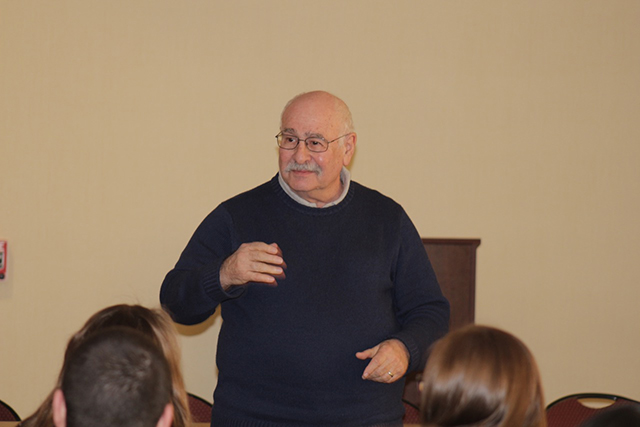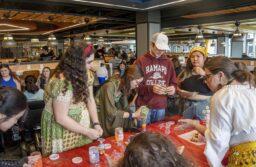
Photo by Thomas Mannion
The features of the new nursing building and the future of the nursing program amidst the school-wide schedule changes were among the topics discussed at last Thursday’s town hall meeting, hosted by the Student Government Association (SGA) in conjunction with the school of Theoretical and Applied Science (TAS). Dean of TAS Edward Saiff and Assistant Dean of Nursing Programs Dr. Kathleen Burke led the discussion.
“It’s certainly the right thing to do,” said Saiff, with regard to why this meeting was held. “This is a community and all the participants in the community certainly have a right to know what’s going on, and so this was just a good way to meet with students and faculty and a couple of administrators and answer any questions anybody had.”
At the meeting, students were prompted to raise any questions or concerns they may have to the professors and administrators in attendance.
One of the main topics up for discussion was the progress of the Adler Center for Nursing Excellence. The building could open as early as April, however, the labs and classrooms in the building may not begin to be used until next semester, simply because it may be too difficult to switch locations mid-semester.
The building will have three permanent simulation rooms, roughly the size of an ICU room; there will be rooms set up for critical care, maternal child and medial and surgical procedure simulations. These rooms have been equipped with the most high-tech equipment and the most realistic dummies available, according to Burke.
“The simulation lab is absolutely state of the art … The size of the sim lab has dramatically increased so we will be able to deal with a smaller group within a particular simulation,” said Burke. “We have full filming capacity at this point as well as full audio capacity for someone like me to hide in a control room … It allows for much stronger and much more rigorous simulations.”
The nursing study abroad program was also discussed by Burke, who confirmed that the program would still be running to Ghana. In the past, the program was held in Sierra Leone, but needed to be moved to Ghana in the past year as a result of the Ebola outbreak.
The number of students per lecture class within TAS was also brought up, as the new schedule changes may lead to a higher number of students in each lab, and consequently more students in each lecture. One student mentioned how one of Ramapo’s most appealing facets is its small class sizes. Saiff responded by assuring that, even though Ramapo’s labs and lectures may have increased occupancies in the future, they will still be relatively small compared to other colleges and that adjustments will be made based on trial and error.
“All of this is relatively new for us, we’ll try to assess how it works … and when we get a better understanding we’ll make adjustments if we need to make adjustments,” said Saiff.
Throughout the meeting, Burke and Saiff answered the questions of the TAS students in attendance. The answered leaders confirmed several questions, including: credit hours for labs are still under discussion, section classes and clinical lab occupancy limits will remain the same and there are no plans to begin a shuttle to assist nursing students in getting to their clinical shifts, based on past experiences with students preferring to take their own transportation.
The town hall meetings have, thus far, been vehicles for the administration and professors to have direct contact with students to answer their questions and listen to their concerns in this time of change at Ramapo.
“I just wanted to know how the new schedule was going to be for us and what the new nursing building would be like,” said junior nursing major Brianna Kropp. “I wanted to hear it from the actual source, rather than from rumors.”
rking2@ramapo.edu





